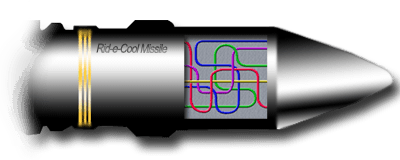The CIA - Central
Intelligence Agency
The Central Intelligence Agencys mission is to collect and evaluate foreign intelligence.
This helps the president of USA and government policy makers in decision making relating to Americas national security. The agency also engages in covert action at the presidents behest. CIA takes no part in any policy making. The CIAs charter prohibits it from domestic spying which comes under the FBI.
History of the CIA
The Central Intelligence Agency is the successor of the OSS. The 'Office of Strategic Services' was a military intelligence agency created during the Second World War. In the year 1945 OSS was abolished. The American president recognized the need for a centralized intelligence system that provided strategic warning and conducted clandestine activities.
In January 1946 President Truman decided to establish the Central Intelligence Group (CIG). It was supervised by National Intelligence Authority which was made of a Presidential representative and the Secretaries of State. Only twenty months later both agencies, the NIA and CIG were dismantled.
Both, Central Intelligence Agency (CIA) and National Security Council (NSC) were formed in 1947 by the 'National Security Act of 1947'. This decision was approved by President Harry Truman. CIA was given the responsibilities of coordinating Americas intelligence activities, evaluating and disseminating any intelligence related to national security.
The Agency also performs other intelligence related duties directed by the NSC.
The 'Central Intelligence Agency Act of 1949' exempted it from disclosing any information about the agency itself. The usual restrictions on the use of funds by CIA were also removed. A program named "PL-110" was created as a consequence of the Act. The purpose of this program was to handle undesirable people outside the normal immigration procedures. These people included the category of essential aliens and defectors. The CIA was responsible for giving those persons new identities and supporting them financially.
In 1953 Congress altered the National Security Act that regulated the appointment of the Deputy Director of Central Intelligence by the President with the consent of the Senate.In the earliest years, CIA was given extraordinary independence. Other government organizations had little control over its operations. This was justified by pointing towards the ruthless tactics employed by KGB. This approach came to an end in the 1970s when former CIA agents were found to be involved in the Watergate break in. President Richard Nixon's attempts at using CIA, to stop investigations by FBI in this matter further degraded CIAs position.
The agency suffered major setbacks when James R. Schlesinger, the DCI of the agency released reports on past CIA wrongdoing. Also known as "the Family Jewels", these reports were kept secret by the Agency until Seymour Hersh of the 'New York Times' published an article about CIAs involvement in keeping files on seven thousand Americans associated with the peace movement and the killing of many foreign leaders. The CIA was later prohibited from spying in the United States and assassination of foreign leaders.
In 1991, the 'Intelligence Authorization Act' was passed that defined any operation in an area where America was not directly involved as "covert operation". This Act also established a chain of command that involves the president and House and Senate Intelligence Committees. In any emergency situation it only requires a "timely notification". Most of the restrictions placed on CIA were later removed after the Al Quaeda attacks of '9/11', September 11, 2001.
Go from Central Intelligence Agency to Secret Service
Go to Top Spy Secrets Homepage











New! Comments
Savvy spies can comment here... Just leave me a comment in the box below.